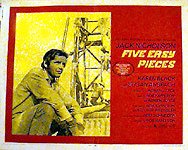
Five Easy Pieces (1970)

Drifting concert pianist Jack Robert Dupea (Jack Nicholson) is working as a roughneck in a California oil field. He and his best friend, Elton (Billy "Green" Bush), when not working together, spend most of their time bowling, downing beers, and just hanging out. Robert, from a family of musicians, is a brilliant classical pianist who has given up the instrument in favor of another life. (The film's title, incidentally, refers to a practice book seen on any youngster's piano.) When his witless waitress girlfriend, Rayette (Karen Black), announces she's pregnant, Robert leaves his job and heads for Los Angeles to visit his sister, Partita (Lois Smith), who is also a pianist and about to record an album.
Partita tells Robert that their father (William Challee) has suffered a pair of strokes back at their home on Puget Sound and he should visit the old man before he dies. When he tells Partita he is going to visit his father, she convinces him to take her. They bid Elton and his wife Stoney (Fannie Flagg) goodbye and begin the drive to Washington. On the road they pick up two lesbians, Palm (Helena Kallianiotes) and Terry (Toni Basil) whose incessant chatter begins to irk Robert. The funniest scene in the picture takes place in a roadside coffee shop where Robert orders a very simple meal. All he wants is toast with his breakfast, but the waitress will allow no substitutions. He finally asks for "a chicken salad sandwich on toast, but throw the chicken away and I'll pay for the sandwich." A brouhaha occurs, and Robert and his three companions are tossed out of the diner. After dropping off the two women hitchhikers, Robert parks Rayette in a motel and goes on to the family home.
The surroundings are even drearier than he recalls after being away three years. His father is in a wheelchair and unable to speak, so Robert doesn't know whether he's getting through to the old man. His brother, Carl (Ralph Waite), is a violinist engaged to a pianist, Catherine (Susan Anspach). Catherine is a gentle soul while Robert is an angry one, yet they cannot keep away from each other. When Carl leaves temporarily, the two of them make love in her room. Rayette, who is, at best, sweet but cotton-headed, arrives at the family home. The others welcome her as cordially as they can, but she is out of place. (She can't, for example, believe the family doesn't have a television in its living room.)
Robert attempts to convince Catherine to run away with him, but they both know it won't work. In a touching scene he explains to his ailing father why he's given up his music and attempts to apologize for his wastrel existence, then breaks into tears. When a snobbish family acquaintance, Samia (Irene Daly) makes fun of Rayette, Robert springs to her defense. Later he discovers his father's burly male nurse massaging his seminude sister, Partita. Enraged, he picks a fight with the husky nurse and gets knocked down for his efforts. Having had enough, he exits with Rayette, stops at a gas station, and abandons her, his car, and all of his possessions, to jump aboard a truck on its way to Alaska and, perhaps, a new start for a life that now seems to be filled with nothing but endings.
The movie ends on a note of ambiguity; Robert is either freeing himself from the waitress or, on the other hand, he is setting off on a journey even deeper into anonymity. It's impossible to say, and it doesn't matter much. What matters is the character during the time covered by the film: a time when Dupea tentatively reapproaches his past and then rejects it, not out of pride, but out of fear.
This moving character study is deceptively simple. Five Easy Pieces is one of the most complex pictures of the 1970s. The film grossed less than $10 million the first time around, but everyone who saw Five Easy Pieces had to have been moved by it. Nicholson was supremely convincing in his role, and every supporting role, down to the smart aleck waitress (Lorna Thayer) was exquisitely cast. It's a perfect portrait of a man totally out of his element wherever he goes. But instead of reaching for the 1960s rebelliousness so often seen in minor movies, Rafelson and screenwriter Adrien Joyce (a pseudonym for Carol Eastman) opted for a unique telling of what might have been a tiresome film in other hands.
The search for a person's identity has seldom been better shown. The film is more character study than story, and the tale has no compelling tension, other than the excellence of the players. In a small role look for Sally Struthers (when she was still using her middle name, Ann, and before she achieved nationwide fame on television's "All In The Family"). Karen Black adds one more unusual portrait to her gallery of excellent performances. Awards The New York Film Critics Circle voted the film Best Picture, Bob Rafelson Best Director, and Black Best Supporting Actress. The picture, the script, Nicholson and Black were also nominated for Oscars but didn't win because of the Patton sweep that year.
CAST:
PERFORMER, CHARACTER
Jack Nicholson, Robert Eroica Dupea
Karen Black, Rayette Dipesto
Billy "Green" Bush, Elton
Fannie Flagg, Stoney
Sally Struthers, Betty
Marlena MacGuire, Twinky Richard Stahl, Recording Engineer
Lois Smith, Partita Dupea
Helena Kallianiotes, Palm Apodaca
Toni Basil Terry Grouse
Lorna Thayer, Waitress
Susan Anspach, Catherine Van Ost
Ralph Waite, Carl Fidelio Dupea
William Challee, Nicholas Dupea
John Ryan, Spicer Irene
PRODUCTION:
Producers, Bob Rafelson and Richard Wechsler
Director, Bob Rafelson
Screenwriter, Adrien Joyce from a story by Joyce and Rafelson
Editors, Gerald Shepard andChristopher Holmes
Cinematographe,r Laszlo Kovacs
Composers, Johann Sebastian Bach, Wolfgang Amadeus Mozart, and Frédéric Chopin